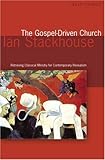 Mark Driscoll is pastor of Mars Hill Church. He’s a unique character – reformed evangelical theologically, pastoring a rapidly growing, culturally relevant church in Seattle. His sense of humour and strong opinions which tend to polarise his hearers as either friends or enemies pretty quickly. I would strongly recommend you check out his sermons online at www.marshillchurch.org. Despite the “hip and trendy” nature of his church, the teaching is very theological and bible based, with sermons lasting well over an hour.
Mark Driscoll is pastor of Mars Hill Church. He’s a unique character – reformed evangelical theologically, pastoring a rapidly growing, culturally relevant church in Seattle. His sense of humour and strong opinions which tend to polarise his hearers as either friends or enemies pretty quickly. I would strongly recommend you check out his sermons online at www.marshillchurch.org. Despite the “hip and trendy” nature of his church, the teaching is very theological and bible based, with sermons lasting well over an hour.
The point of this book is to explain what he calls “reformission”, which he simply defines as a radical call to Christians and churches to recommit to living and speaking the gospel. He speaks about the need to remain faithful to the gospel (love the Lord), to our culture (love our neighbour) and to the church (love our brother). He goes on to show how many have opted for just two out of those three options (resulting in parachurch, liberalism or fundamentalism).
The first half of the book is about the gospel, showing how the old message can be presented in a fresh way to answer new questions. There is a fundamental commitment to the belief that the gospel connects with this life. He urges us to let non-Christians come among us and see the gospel in action, hear us talk it and live it, before they come to accept it for themselves. Essentially we must be willing for people to “belong” before they believe. He claims that the transformed lives of people in the church are both the greatest arguments for and the greatest explanation of the gospel.
If we are to do this we first need to confront and deal with our prejudices and start to be aware of our culture, which is the subject of the second half of the book. We need to immerse ourselves in our culture for education not entertainment – so we can understand the “why” and not just the “what” of our culture.
He warns us against equating culture with worldliness, but at the same time, there are many ideas in our culture that must be challenged with the truth of the gospel. So for example, our culture encourages us to see ourselves as victims where the Bible says we are sinners.
The issue of how exactly Christians relate to their culture is notoriously tricky, and he helpfully warns against four “ruts” that we can get into – separating from culture (like the Pharisees), blending into culture (the Saducees), ruling over culture (the Zealots) and ignoring culture (the Essenes).
Towards the end of the book, he deals with postmodernism, a culture as much in need of redeeming as any that have gone before it. He distances himself here from some of the ideas of the emerging church (in his usual unsubtle manner).
There are parts of the book that will be controversial for more conservative evangelicals, for example, his more permissive attitude towards subjects like alcohol. His robust complimentarianism won’t win him any friends amongst egalitarians either. Each chapter is interspersed with an interview of a Christian whose line of work raises issues of engagement with culture – a brewer, a tattooer, a band manager, a former pole dancer and so on. The book is by no means academic and dry in style – it is littered with his pithy one-liners and off the wall illustrations, making it a very easy read.
I recommend this book as a worthwhile and enjoyable read for anyone thinking about how the church can reach an increasingly “unchurched” generation. The answer isn’t to modify the gospel to make it more acceptable, or to retreat into holy huddles and wait for the rapture. As the tag-line for the book states, we need to be “reaching out without selling out”. From listening to his sermons online, I can also add that he does seem to be practising what he preaches. He proclaims a Jesus-centred message that deals seriously with sin, but presents it in a very contemporary style.

 This book tells the story of
This book tells the story of  I think many evangelicals would consider Piper to be one of the finest expository preachers in modern times, so if there was ever a subject he was qualified to write on, preaching would surely be it. But those looking for a practical how-to guide on effective public speaking will not find it here. This book is about the driving force that Piper believes must be behind all true preaching – a passion for the glory of God.
I think many evangelicals would consider Piper to be one of the finest expository preachers in modern times, so if there was ever a subject he was qualified to write on, preaching would surely be it. But those looking for a practical how-to guide on effective public speaking will not find it here. This book is about the driving force that Piper believes must be behind all true preaching – a passion for the glory of God.




